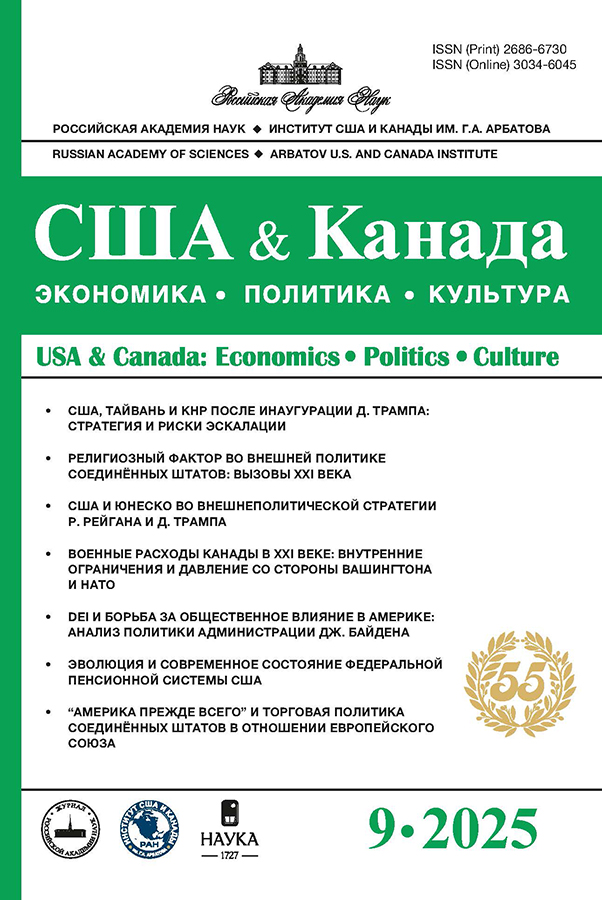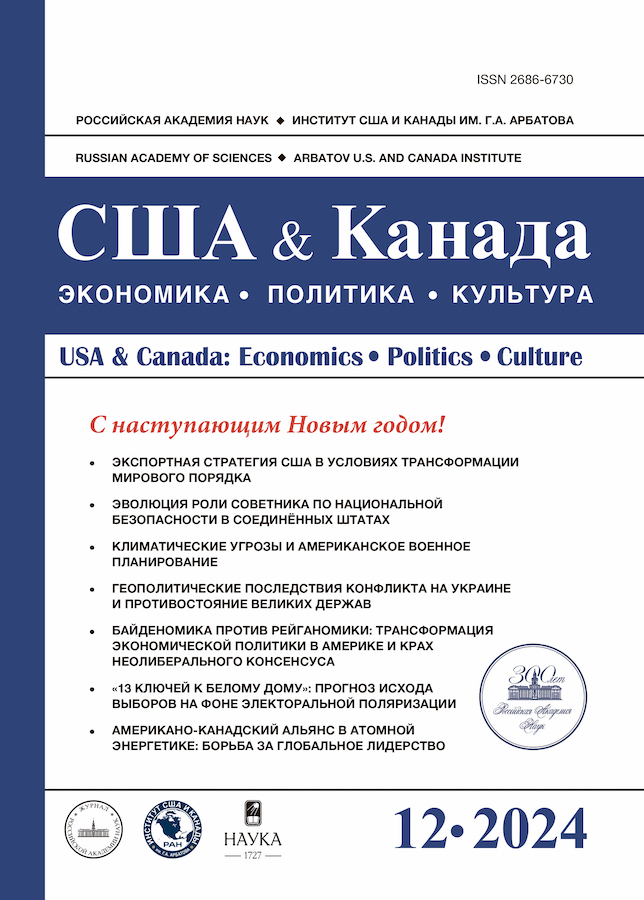Transregional Security Impacts of the Special Military Operation and Strategic Interests of the United States and China (Part 2)
- Authors: Yixiang S.1,2,3
-
Affiliations:
- MGIMO
- Faculty of Political Sciences of the Lomonosov Moscow State University
- Institute of Chinese and Contemporary Asian Studies of the Russian Academy of Sciences
- Issue: No 12 (2024)
- Pages: 20-33
- Section: The Current Discourse
- URL: https://journals.eco-vector.com/2686-6730/article/view/662436
- DOI: https://doi.org/10.31857/S2686673024120029
- EDN: https://elibrary.ru/WPAPCW
- ID: 662436
Cite item
Abstract
The article analyzes the evolving dynamics of global strategic interests amid major international conflicts, focusing on the geopolitical consequences of the Russia-Ukraine conflict and the strategic maneuvers of key powers like the United States, NATO, China, and Russia. It explores how the U.S. has utilized the conflict to realign its global influence, strengthen NATO, and project power in the Indo-Pacific, emphasizing its intention to counter both Russian and Chinese influence. The U.S. benefits economically from Europe's growing dependency, while using the conflict to enhance military-industrial partnerships and sanctioning regimes targeting Russia and China. China’s strategic realignment, in response, seeks to bolster Sino-Russian cooperation and expand influence in the Asia-Pacific through initiatives like the "Asian Mediterranean" concept, which envisions deeper Eurasian integration. The author outlines China’s attempts to balance its maritime and land power dynamics while navigating heightened U.S. efforts to isolate it diplomatically and militarily. It also highlights the potential for high-tech cooperation between China and Russia as a countermeasure to Western sanctions and technological blockades.
Keywords
About the authors
Sun Yixiang
MGIMO; Faculty of Political Sciences of the Lomonosov Moscow State University; Institute of Chinese and Contemporary Asian Studies of the Russian Academy of Sciences
Author for correspondence.
Email: sunyixiang123@mail.ru
master's student of School of Governance and Politics; Intern Moscow, Russiaт Federation; Moscow, Russiaт Federation; Moscow, Russiaт Federation
References
- Joint Readout of Quad Leaders Call. The White House, March 3, 2022. Available at: https://www.whitehouse.gov/briefing-room/statements-releases/2022/03/03/joint-readout-of-quad-leaders-call/.
- Brunnstrom, D., Martina, M. U.S. can Focus on Two Theaters-Indo-Pacific and War in Europe, Official says. Reuters, March 1, 2022. Available at: https://www.reuters.com/world/china/us-can-focus-two-theaters-indo-pacific-war-europe-official-says-2022-02-28/.
- How the war in Ukraine is impacting security in the Indo-Pacific. Breaking Defense. June 14, 2022. Available at: https://breakingdefense.com/2023/06/how-the-war-in-ukraine-impacts-asian-security/.
- The United States continues to send weapons to Ukraine, Military Enterprises Make lots of "War Money". Available at: https://new.qq.com/rain/a/20230224A0940200.
- NATO 2022 Strategic Concept, NATO, June 29, 2022, p.5–10. Available at: https://www.nato.int/nato_static_fl2014/assets/pdf/2022/6/pdf/290622-strategic-concept.pdf
- Madrid Summit Declaration: Issued by NATO Heads of State and Government participating in the meeting of the North Atlantic Council in Madrid, NATO, June 29, 2022. Available at: https://www.nato.int/cps/en/natohq/official_texts_196951.htm
- Vilnius Summit Communiqué: Issued by NATO Heads of State and Government participating in the meeting of the North Atlantic Council in Vilnius, NATO, July 11, 2023. Available at: https://www.nato.int/cps/en/natohq/official_texts_217320.htm
- Opening remarks by NATO Secretary General Jens Stoltenberg at the meeting of the North Atlantic Council at the level of Heads of State and Government, with Sweden, Indo-Pacific Partners, and the EU, NATO, July 12, 2023. Available at: https://www.nato.int/cps/en/natohq/opinions_217091.htm?selectedLocale=en.
- de Lisle, J., Cozen, S.A. (2022). Russia’s War on Ukraine: Implications for China and Indo-Pacific Regional Security. University of Pennsylvania. Available at: https://global.upenn.edu/sites/default/files/perry-world-house/delisleukrain-ethoughtpiece.pdf
- Galic, M., Harding, B., Salikuddin, T., Singh, V. Amid Ukraine War, U.S. Signals the Indo-Pacific is a Vital Priority, United States Institute of Peace, June 9, 2022. Available at: https://www.usip.org/publications/2022/06/amid-ukraine-war-us-signals-indo-pacific-vital-priority.
- Gipouloux, F. (2009). La Méditerranée asiatique: Villes portuaires et réseaux marchands en Chine, au Japon et en Asie du Sud-Est, XVIe -XXIe siècle. CNRS Éditions.
- Hornung, J.W., Channer, H. (2022, May 26). Russia’s Invasion of Ukraine May Harden U.S. Indo-Pacific Allies. RAND Corporation. Available at: https://www.rand.org/pubs/commentary/2022/05/russias-invasion-of-ukraine-may-harden-us-indo-pacific.html
- Regional Perspectives Report on the Indo-Pacific: Strategic Foresight Analysis, The NATO Allied Command Transformation Headquarters, May 2023. Available at: https://www.act.nato.int/wp-content/uploads/2023/05/regional-perspectives-2022-07-v2-1.pdf
- Ross, R.S. (1999). The Geography of the Peace: East Asia in the Twenty-First Century.International Security, 23(4), pp.81–118.
- Simón, L. NATO’s China and Indo-Pacific conundrum, November 22, 2023, NATO Review. Available at: https://www.nato.int/docu/review/articles/2023/11/22/natos-china-and-indo-pacific-conundrum/index.html
- Wishnick, E. (2023, January 30). Ukraine’s ripple effect on Russia’s Indo-Pacific horizon. Danish Institute for International Studies. Available at: https://www.diis.dk/en/research/ukraines-ripple-effect-on-russias-indo-pacific-horizon.
Supplementary files











